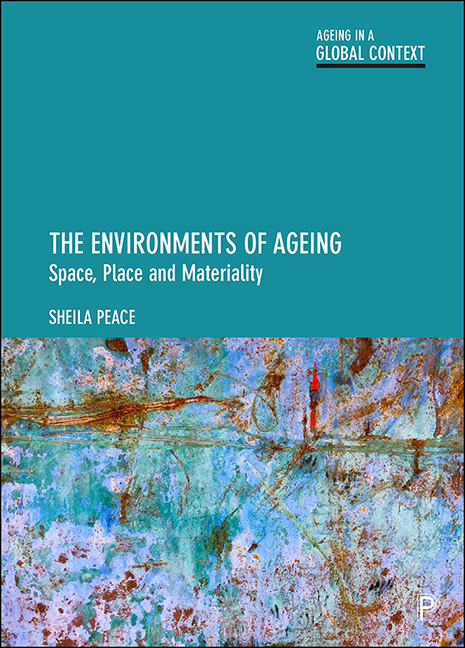Book contents
- Frontmatter
- Dedication
- Contents
- List of figures and tables
- Research summaries
- List of acronyms
- About the author
- Acknowledgements
- Series editors’ preface
- Preface: understanding the structure
- 1 Person and environment
- 2 Theoretical development
- 3 The global context
- 4 Environmental living
- 5 Housing in later life
- 6 Housing histories, housing options
- 7 Alternative environments: specialised housing (with care)
- 8 Care home living: a form of long-term care
- 9 Methodological development
- 10 Rethinking the spatiality of ageing
- Glossary of terms
- References
- Index
3 - The global context
Published online by Cambridge University Press: 15 September 2022
- Frontmatter
- Dedication
- Contents
- List of figures and tables
- Research summaries
- List of acronyms
- About the author
- Acknowledgements
- Series editors’ preface
- Preface: understanding the structure
- 1 Person and environment
- 2 Theoretical development
- 3 The global context
- 4 Environmental living
- 5 Housing in later life
- 6 Housing histories, housing options
- 7 Alternative environments: specialised housing (with care)
- 8 Care home living: a form of long-term care
- 9 Methodological development
- 10 Rethinking the spatiality of ageing
- Glossary of terms
- References
- Index
Summary
Introduction
… by 2050, one in six people in the world will be over age 65 (16%), up from one in 11 in 2019 (9%). By 2050, one in four persons living in Europe and Northern America could be aged 65 or over. In 2018, for the first time in history, persons aged 65 or above outnumbered children under five years of age globally. The number of persons aged 80 years or over is projected to triple, from 143 million in 2019 to 426 million in 2050. (UN, 2020)
In the preface to this book, it was noted that a key objective was to address environments of ageing at different levels of spatial scale (Figure 0.1). This chapter focuses on the global context. As this quote from the United Nations (UN) shows, population ageing continues to advance, occurring during a period of dynamic change when globalisation is producing time–space compression through technological development, and when global capitalism is resulting in consumerism becoming more universal (Sassen, 2004; Jones et al, 2008). The interface between major transformations in global health, demography and household composition is changing during a time of parallel challenges regarding urbanisation, migration, climate change, the built environment and technological development. Neo-liberalism has become the dominant political force, leading environments to become more or less inclusive for different cohorts, generations and groups (Walker, 2005; Phillips and Feng, 2018; IMF, 2020a, 2020b). The issues addressed here are historic and ongoing, with authors such as Phillipson (2003, 2007a, 2007b) alerting us to their breadth, diversity and impact on the ageing individual (see Figure 3.1). Recognition of such changes is discussed internationally and made local through social media (Hyde and Higgs, 2016; Ortega, 2018).
These are factors at macro-level that provide the global context for population ageing; where strategic interactions supported through supranational institutions – the European Union (EU), the Organisation for Economic Co-operation and Development (OECD), the UN, especially the Department of Economic and Social Affairs (DESA) and the World Health Organization (WHO) – influence policy development at all levels, including the UN 17 Sustainable Development Goals (see the Glossary). Throughout this text, global population ageing using WHO and UN data is defined as including people both 60 or older and 65 and over. Where discussion focuses on the UK, 65 or older is commonly used.
- Type
- Chapter
- Information
- The Environments of AgeingSpace, Place and Materiality, pp. 49 - 72Publisher: Bristol University PressPrint publication year: 2022



